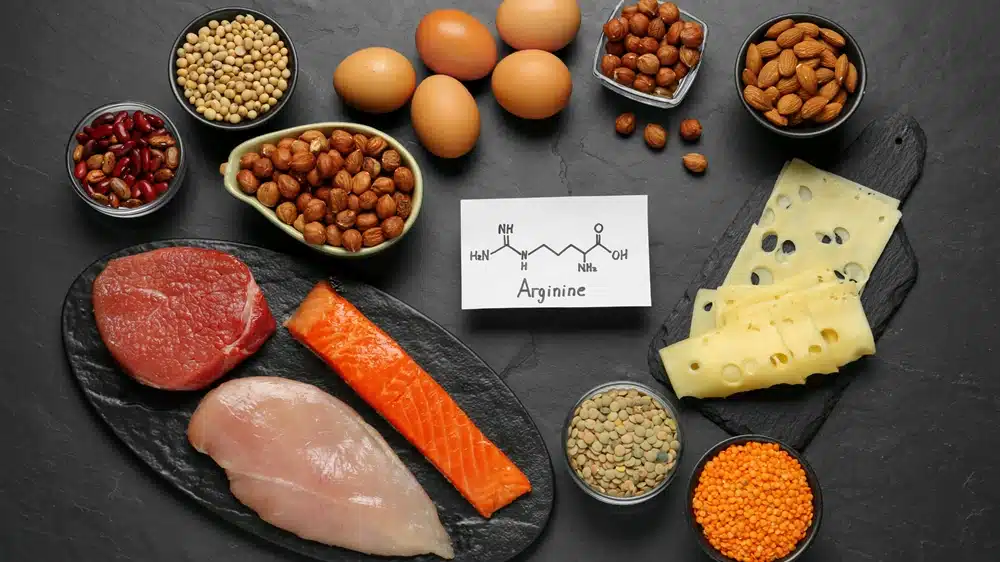
L-Citrulline vs L-Arginine:Imagine your body as a bustling city, with blood vessels as highways delivering oxygen and nutrients to every corner. Now, picture nitric oxide (NO) as the traffic controller, ensuring smooth flow without gridlock. Two amino acids, L-Citrulline and L-Arginine, are like the city’s top engineers, working to boost NO production and keep those highways open. But which one should you choose for your health journey? Whether you’re hitting the gym, managing blood pressure, or just curious about dietary supplement ingredients, this guide breaks down the differences, benefits, and how to pick the right one for you. Let’s dive in!
What Are Amino Acids and Why Do They Matter?
Amino acids are the building blocks of proteins, essential for everything from muscle repair to immune function. Think of them as Lego pieces snapping together to build your body’s structures and systems. There are 20 standard amino acids, split into two groups:
- Essential Amino Acids: These can’t be made by the body and must come from food (e.g., meat, eggs, or soy).
- Non-Essential Amino Acids: Your body can produce these, but supplements can boost their effects.
L-Citrulline and L-Arginine fall into the non-essential (or semi-essential) category, but their role in producing NO makes them stars in sports nutrition and cardiovascular health. NO relaxes blood vessels, improving blood flow, which can enhance exercise performance and heart function. Curious about how these amino acids work? Let’s explore each one.
What Is L-Citrulline?

L-Citrulline is a non-essential amino acid named after Citrullus vulgaris (Latin for watermelon), its richest natural source. Your body also produces it in the liver and intestines, and it’s available in powder manufacturing supplements like capsules or drinks. Unlike some amino acids, L-Citrulline doesn’t build proteins directly but plays a key role in the urea cycle, helping remove toxic ammonia from the body. More importantly, it’s converted into L-Arginine in the kidneys, which then produces NO.
How Does L-Citrulline Work?
Picture L-Citrulline as a backstage crew member, quietly setting the stage for L-Arginine to shine. Once ingested, it bypasses the gut and liver (unlike L-Arginine), making it highly bioavailable. This means more of it reaches your bloodstream to boost L-Arginine levels, leading to sustained NO production. This process is why L-Citrulline is a favorite in custom formula supplements for long-term benefits.
Benefits of L-Citrulline
L-Citrulline’s ability to increase NO makes it a powerhouse for several health goals:
- Enhanced Athletic Performance: Research shows L-Citrulline can reduce muscle fatigue and boost endurance. A study in the Journal of Strength and Conditioning Research found that 6-8 grams of L-Citrulline malate taken before exercise improved weightlifting performance and reduced post-workout soreness .
- Heart Health: By widening blood vessels, L-Citrulline may lower blood pressure. A meta-analysis in the Journal of Nutrition reported a 4-15% reduction in blood pressure in people with hypertension after 7-8 weeks of supplementation .
- Erectile Dysfunction (ED): Improved blood flow from NO can help with mild ED. A small study noted an 8.3% improvement in ED scores with L-Citrulline compared to a placebo .
- Reduced Fatigue: L-Citrulline supports the urea cycle, clearing ammonia that causes fatigue, making it a staple in sports nutrition manufacturing.
While these benefits are promising, some studies show mixed results, especially for aerobic exercise like running. More research is needed to confirm its full potential.
What Is L-Arginine?

L-Arginine is a semi-essential amino acid, meaning your body makes it, but you might need more during stress, illness, or intense exercise. Found in protein-rich foods like red meat, fish, dairy, and nuts, it’s also a popular supplement in OEM solutions for its direct role in NO production. Unlike L-Citrulline, L-Arginine is quickly converted into NO by an enzyme called nitric oxide synthase (NOS).
How Does L-Arginine Work?
Think of L-Arginine as a sprinter, delivering a fast burst of NO to open blood vessels. However, when taken orally, it faces a hurdle: about 40% is broken down in the gut and liver before reaching the bloodstream. This “first-pass metabolism” reduces its effectiveness compared to L-Citrulline, but it still offers quick benefits for specific needs.
Benefits of L-Arginine
L-Arginine’s direct NO production makes it valuable for:
- Improved Blood Flow: It can ease symptoms of angina and peripheral arterial disease by enhancing circulation. A 2021 meta-analysis found L-Arginine reduced blood pressure by 2.2-5.4 mmHg in hypertensive adults .
- Exercise Performance: Some studies suggest L-Arginine improves oxygen delivery to muscles, aiding high-intensity workouts, though results are inconsistent .
- Immune Support and Wound Healing: L-Arginine supports immune cell production and tissue repair, potentially reducing hospital-acquired infections by 40% in surgical patients .
- Erectile Dysfunction: Its vessel-widening effects may help with ED, especially when combined with other supplements like pine bark extract .
However, L-Arginine isn’t a magic bullet. Some research, like a trial halted due to adverse effects in heart attack patients, suggests caution in certain cases .
L-Citrulline vs L-Arginine: Key Differences
So, what’s the difference between L-Citrulline and L-Arginine? Let’s break it down:
| Aspect | L-Citrulline | L-Arginine |
|---|---|---|
| Role in NO Production | Indirect; converts to L-Arginine, then NO | Direct precursor to NO via NOS |
| Absorption | High bioavailability; bypasses gut/liver | ~40% lost to first-pass metabolism |
| Dosage (Daily) | 6-8 g for exercise; 2-6 g for heart health | 6-9 g for exercise; 3-6 g for heart health |
| Benefits | Sustained NO, endurance, blood pressure, ED | Quick NO boost, blood flow, immune support |
| Side Effects | Rare, well-tolerated | Possible GI upset at >10 g |
- Effectiveness: A study in the British Journal of Clinical Pharmacology found L-Citrulline (3 g twice daily) increased plasma L-Arginine levels 35% more than L-Arginine itself, leading to higher NO production .
- Speed: L-Arginine acts faster, peaking in blood within 30-60 minutes, while L-Citrulline offers sustained effects over hours .
- Applications: L-Citrulline is better for long-term goals like endurance or heart health, while L-Arginine suits immediate needs like pre-workout boosts.
Can They Be Taken at the Same Time?
Yes, combining L-Citrulline and L-Arginine can be a game-changer! Research shows they work synergistically to boost NO production more than either alone. A 2014 study in Biochemical and Biophysical Research Communications found that 1 g of each taken together rapidly increased plasma L-Arginine and NO levels in healthy males . Another study on soccer players showed that 1.2 g of each daily for 6 days improved 10-minute cycling performance .
This combo is popular in sports nutrition supplements, often found in powder manufacturing pre-workouts or custom formula blends. It offers both quick and sustained NO boosts, ideal for athletes or those seeking cardiovascular benefits. However, start with lower doses (e.g., 1-2 g each) to assess tolerance, and consult a doctor, especially if you’re on medications like phosphodiesterase-5 inhibitors for ED, as combining them could lower blood pressure too much .
How to Choose the One That Suits You
Choosing between L-Citrulline, L-Arginine, or both depends on your goals:
- For Athletes: L-Citrulline (6-8 g, 1 hour before exercise) is ideal for endurance and recovery due to its sustained NO production. Try packaging service options like citrulline malate powders for convenience.
- For Heart Health: L-Citrulline (2-6 g daily) may offer better long-term blood pressure control. L-Arginine (3-6 g) can help with acute circulation needs but has less consistent evidence.
- For Erectile Dysfunction: L-Citrulline shows promise for mild ED, with studies suggesting 2-6 g daily. L-Arginine may work better in combination with other supplements.
- For General Wellness: Combining both (1-2 g each) could maximize NO benefits, supporting circulation and immune function.
Considerations:
- Side Effects: L-Arginine can cause nausea or diarrhea at doses above 10 g. L-Citrulline is generally safer but may interact with certain medications.
- Health Conditions: Avoid L-Arginine if you have herpes, as it may trigger outbreaks. Those with recent heart attacks should steer clear due to potential risks .
- Quality: Choose high-quality supplements from reputable OEM solutions with third-party testing to ensure purity.
Always consult a healthcare professional before starting, especially if you’re pregnant, nursing, or on medications. Your doctor can tailor a custom formula to your needs, ensuring safety and efficacy.
FAQs
Which is better, arginine or citrulline?
L-citrulline is generally considered better because it’s more effective at increasing nitric oxide (NO) levels and improving blood flow. It’s better absorbed and converts to L-arginine in the body, providing longer-lasting effects.
How long does it take for L-citrulline to work?
Effects on blood flow or exercise performance may be noticeable within 1-2 hours for acute doses. For ED or blood pressure, consistent use over 1-4 weeks is typically needed for significant benefits.
What are the disadvantages of citrulline?
Mild stomach upset in some cases.
High doses (>10g) may cause digestive discomfort.
Limited long-term studies on high-dose use.
May interact with certain medications (e.g., nitrates).
What should you not mix with L-arginine?
Avoid mixing with:
Nitrates or blood pressure medications (risk of low blood pressure).
PDE5 inhibitors (e.g., Viagra) without medical advice.
High doses of other NO boosters (overkill on NO production).
What is the best nitric oxide supplement?
L-citrulline (or citrulline malate) is often considered the best due to its superior absorption and ability to raise NO levels effectively. Doses of 6-8g daily are common. Combination supplements with L-arginine or beetroot extract can also be effective.
What happens if I take L-arginine every day?
Daily use may improve blood flow, exercise performance, and erectile function. However, risks include digestive issues, potential herpes flare-ups, or low blood pressure. Consult a doctor for long-term use.
Does L-citrulline increase vein size?
L-citrulline promotes vasodilation, which can temporarily make veins appear larger or more prominent due to increased blood flow, especially during exercise (“pump” effect).
Is L-arginine or L-citrulline better for blood pressure?
L-citrulline is better for blood pressure. It raises L-arginine levels more effectively, leading to sustained NO production and vasodilation. Studies show 3-6g daily can lower blood pressure modestly.
Conclusion: Your Path to Better Health
L-Citrulline and L-Arginine are like two sides of the same coin, each offering unique benefits through NO production. L-Citrulline stands out for its efficiency and sustained effects, making it a top choice for endurance athletes and those focused on heart health. L-Arginine shines for quick boosts, ideal for pre-workout or immediate circulation needs. Together, they can be a powerhouse, especially in sports nutrition manufacturing blends.
The science isn’t perfect—some studies show mixed results, and individual responses vary. But with proper dosing and medical guidance, these dietary supplement ingredients can support your goals, whether you’re chasing a personal best or better blood flow. So, talk to your doctor, pick a high-quality supplement, and let these amino acids help you thrive!
References:
- Journal of Strength and Conditioning Research
- Journal of Nutrition
- WebMD – L-Citrulline
- PMC – Therapeutic Benefits of L-Arginine
- Healthline – L-Arginine
- WebMD – Arginine Heart Benefits
- British Journal of Clinical Pharmacology
- Biochemical and Biophysical Research Communications
- PMC – Cycling Performance Study



